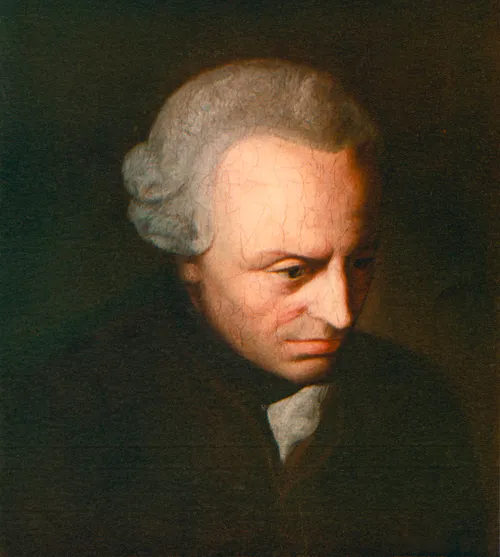
Immanuel Kant: The Architect of Modern Philosophy
Introduction
Immanuel Kant, a central figure in modern philosophy, profoundly influenced various fields including metaphysics, epistemology, ethics, and aesthetics. His critical philosophy, especially the "Critique of Pure Reason," revolutionized the way we understand human cognition and the limits of knowledge. Kant's work remains a cornerstone of philosophical inquiry and continues to shape contemporary thought.
Life and Historical Context
Born in 1724 in Königsberg, Prussia (now Kaliningrad, Russia), Kant spent most of his life in his hometown. He studied at the University of Königsberg, where he later became a professor. Kant's work came during the Enlightenment, a period that emphasized reason, science, and the questioning of traditional authority. His philosophical pursuits aimed to reconcile scientific knowledge with metaphysical inquiry.
Key Ideas and Philosophical Contributions
Kant's philosophy addresses the nature of human understanding and the structure of reality, introducing several pivotal concepts.
The Copernican Revolution in Philosophy: Kant argued that rather than our knowledge conforming to objects, objects conform to our knowledge. This shift placed the human mind at the center of epistemological inquiry.
Transcendental Idealism: Kant proposed that our experience of reality is shaped by the mind's structures. We perceive phenomena, but the "thing-in-itself" (noumenon) remains beyond our direct comprehension.
Categorical Imperative: In his ethical theory, Kant introduced the categorical imperative, a principle that acts as a universal moral law. It asserts that one should act only according to maxims that can be universalized.
Synthetic A Priori Knowledge: Kant distinguished between analytic and synthetic judgments and argued for the existence of synthetic a priori knowledge—truths that are both informative and necessary, like the principles of mathematics and natural science.
Aesthetics: In the "Critique of Judgment," Kant explored the nature of beauty and the sublime, asserting that aesthetic experience is rooted in the interplay between sensory perception and rational reflection.
Influence and Legacy
Kant's work has had a lasting impact on various disciplines, including philosophy, psychology, and political theory. His ideas laid the groundwork for subsequent philosophical movements such as German Idealism, phenomenology, and existentialism. Kant's emphasis on the limits of human knowledge and the autonomy of the moral agent continues to resonate in contemporary debates.
Notable Works
Kant's extensive writings cover a broad range of philosophical topics:
Critique of Pure Reason: Analyzes the foundations and limits of human knowledge.
Critique of Practical Reason: Explores the nature of moral reasoning and the principles of ethical conduct.
Critique of Judgment: Examines aesthetics and the principles of beauty and the sublime.
Groundwork for the Metaphysics of Morals: Introduces the concept of the categorical imperative and the basis of moral law.
Prolegomena to Any Future Metaphysics: A concise summary and explanation of the ideas presented in the "Critique of Pure Reason."
Metaphysics of Morals: Elaborates on the principles of moral philosophy and justice.
Conclusion
Immanuel Kant's profound insights into the nature of knowledge, ethics, and aesthetics continue to shape philosophical discourse. His critical philosophy challenges us to examine the structures of our understanding and the principles guiding our moral decisions. By grappling with Kant's ideas, we are invited to engage in a deeper exploration of human cognition, morality, and the quest for meaning.
Further Reading and External Links
- Kant, Immanuel. Critique of Pure Reason. Archive.org
- Kant, Immanuel. Critique of Practical Reason. Archive.org
- Kant, Immanuel. Critique of Judgment. Archive.org
- Kant, Immanuel. Groundwork for the Metaphysics of Morals. Archive.org
- Stanford Encyclopedia of Philosophy: Kant
- Internet Encyclopedia of Philosophy: Kant
- Encyclopedia Britannica: Immanuel Kant
This article aims to provide a comprehensive overview of Immanuel Kant's philosophy, encouraging further exploration and understanding of his profound contributions to human thought.